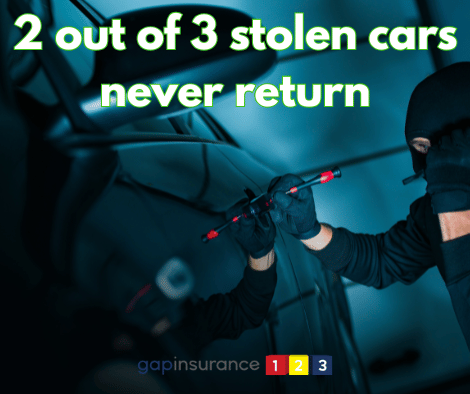Call Monday-Friday 9am - 6pm Closed Saturday & Sunday
Over 68% of stolen cars never come back. How GAP Insurance can help protect your finances.
Every year, tens of thousands of vehicles are stolen in the UK. For the period between April 2023 and March 2024, more than 129,000 vehicles were stolen, according to the new data from the Office for National Statistics (ONS).
That’s one every four minutes.
And the real concern isn’t just the number stolen, it’s what happens afterwards, most stolen vehicles are never recovered.
Recent ONS data shows that only 31.8% of stolen vehicles are returned to their owners. That means nearly 7 in 10 vanish permanently, leaving victims with not just the inconvenience, but potentially thousands of pounds in financial loss.
In this article, we’ll look at how vehicle theft happens, the financial fallout, and how GAP Insurance can help you if your car is stolen and not recovered.
How and Where Vehicle Theft Happens
Vehicle theft is not just a problem in urban areas, or something that happens late at night. 
According to crime data and industry reports:
- 43% of vehicle thefts happen in driveways or semi-private areas.
- 19% occur on the street near the victim’s home or workplace.
- Nearly half of theft attempts are through unlocked doors, making it one of the most common methods.
Many thefts happen overnight, while cars are parked at home. Others occur during the day in public areas such as supermarket car parks.
In recent years, the increasing trend of keyless car theft has also added to the statistics.
The impact of Vehicle Theft on your finances
If your car is stolen and never recovered, you might assume your insurance will make you whole. Unfortunately, that’s not always the case:
- Standard motor insurance usually pays the current market value, not the price you paid.
- Vehicles typically lose 15%-35% of their value in the first year.
- If you’re on finance or lease, you could still owe more than the insurance payout.
An example
You buy a new car for £30,000.
A year later, it’s stolen.
Your insurer values it at £21,000 based on depreciation.
On a PCP or lease agreement, you might still owe £26,000.
That leaves a £5,000 shortfall, money you’ll need to find yourself if you do not have protection for this eventuality.
The Emotional and Practical Fallout
Vehicle theft is more than a financial problem. Victims often report:
- Loss of mobility and disruption to daily routines.
- Stress and anxiety can impact those relying on the car for work.
- Extra costs for public transport or hire cars.
Perhaps most frustrating is the low chance of resolution. Nationally, only 2.8% of vehicle theft cases lead to a charge or summons. In some areas, the rate is under 1%. Even if you report the theft, the odds of getting your car back, and in usable condition, may be slim.
How GAP Insurance Protects You
If you are concerned about the financial impact of vehicle theft, then GAP (Guaranteed Asset Protection) Insurance can help.
GAP Insurance covers the difference between your insurer’s market value payout and one of:
- The invoice price you paid for the vehicle, or
- The outstanding balance on your finance or lease agreement.
- The replacement cost of an equivalent vehicle.
How you are protected depends on which type of GAP Insurance you buy.
If your vehicle is written off or stolen and unrecovered, GAP Insurance helps ensure you’re not left covering the shortfall yourself.
It’s especially valuable in the first 3-4 years of ownership, when depreciation has compounded.
Deter the car thieves
You cannot stop the threat of theft completely, but there are things you can do to lower the risk.
- Make sure you lock your car, even for short stays.
- Don’t leave keys in easy view at home.
- Use a steering lock or other visible deterrent.
- Consider fitting a GPS tracker.
- Park in well-lit, busy areas whenever possible.
Final Thoughts
Vehicle theft is more common than many realise, and the consequences go far beyond the hassle of replacing a car. With over 68% of stolen vehicles never recovered and standard insurance often leaving a financial gap, GAP Insurance offers a practical way to protect your investment.
If you’ve recently bought a new or nearly-new vehicle, or taken out a lease or finance plan, consider what would happen if it disappeared tomorrow.
GAP Insurance is a cost-effective financial protection for real-world risks.
Written by Mark Griffiths, published 9/8/2025
Sources
Car theft statistics - Office for National Statistics


